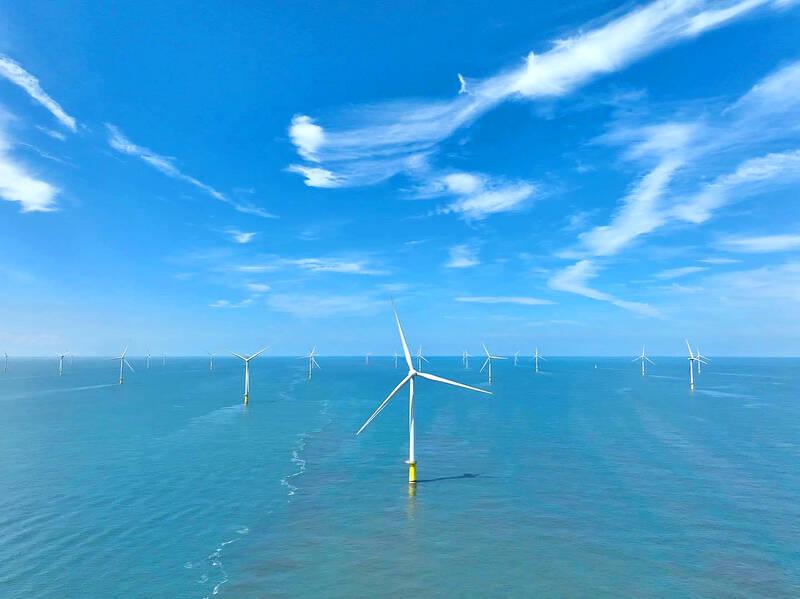The Ministry of Economic Affairs yesterday said it is relaxing industrial policy, as it seeks to resolve disputes with the EU over offshore wind energy projects before the settlement period expires at the end of this month.
The ministry’s remarks came after Minister of Economic Affairs J.W. Kuo (郭智輝) yesterday met with developers of offshore wind energy zones 3-1 and 3-2 to discuss obstacles that might hinder them from completing the installations of wind power turbines and connecting them to grids by 2030 at the latest.
Taiwan’s industrial policy was the top issue brought up by offshore wind energy developers, followed by availability of bank loans from government-controlled lenders, the ministry said.

Photo courtesy of Skyborn Renewable Taiwan Co via CNA
“The ministry is negotiating with the EU under the WTO framework,” the ministry said in a statement.
“The consultation had a positive atmosphere and is moving toward a settlement,” it added.
The government is to loosen its industrial policy, the ministry said.
That means offshore wind farm developers might not be penalized if any force majeure factors lead to the postponement in wind farm constructions, such as delays in local supplies of components and maritime engineering services — the unavailability of geotechnics drilling vessels, for example — an official said.
Offshore wind energy developers can submit applications to the ministry for a review, under the condition that those wind turbines must be erected as scheduled while safeguarding the public’s interests, the ministry said.
The EU on July 26 requested dispute settlement consultations at the WTO on concerns over local content criteria for offshore wind energy projects.
Taiwan’s local content eligibility and award criteria in energy capacity allocation auctions for offshore wind farms are inconsistent with its WTO commitment to not discriminate against imported goods and services, the EU said.
The EU said at the time that it can request the WTO to set up a panel to rule on this matter if the two parties fail to reach a satisfactory solution within 60 days, or by Friday.
The ministry said that offshore wind energy developers are hoping to get the government’s support in a symbolic way, so they are aiming to obtain bank loans from government-controlled lenders.
The ministry said that to reach that goal, it would arrange meetings between officials from the National Development Council, the Financial Supervisory Commission, the Ministry of Finance and offshore wind energy developers this month to gain a holistic picture of the industry before granting loans.
That is an imminent task to significantly boost green energy capacity by 2030, it said.
Demand from local firms are growing rapidly given mounting pressure to meet customers’ requirements of adopting a certain degree of green energy, the ministry added.

Hon Hai Precision Industry Co (鴻海精密) yesterday said that its research institute has launched its first advanced artificial intelligence (AI) large language model (LLM) using traditional Chinese, with technology assistance from Nvidia Corp. Hon Hai, also known as Foxconn Technology Group (富士康科技集團), said the LLM, FoxBrain, is expected to improve its data analysis capabilities for smart manufacturing, and electric vehicle and smart city development. An LLM is a type of AI trained on vast amounts of text data and uses deep learning techniques, particularly neural networks, to process and generate language. They are essential for building and improving AI-powered servers. Nvidia provided assistance

DOMESTIC SUPPLY: The probe comes as Donald Trump has called for the repeal of the US$52.7 billion CHIPS and Science Act, which the US Congress passed in 2022 The Office of the US Trade Representative is to hold a hearing tomorrow into older Chinese-made “legacy” semiconductors that could heap more US tariffs on chips from China that power everyday goods from cars to washing machines to telecoms equipment. The probe, which began during former US president Joe Biden’s tenure in December last year, aims to protect US and other semiconductor producers from China’s massive state-driven buildup of domestic chip supply. A 50 percent US tariff on Chinese semiconductors began on Jan. 1. Legacy chips use older manufacturing processes introduced more than a decade ago and are often far simpler than

STILL HOPEFUL: Delayed payment of NT$5.35 billion from an Indian server client sent its earnings plunging last year, but the firm expects a gradual pickup ahead Asustek Computer Inc (華碩), the world’s No. 5 PC vendor, yesterday reported an 87 percent slump in net profit for last year, dragged by a massive overdue payment from an Indian cloud service provider. The Indian customer has delayed payment totaling NT$5.35 billion (US$162.7 million), Asustek chief financial officer Nick Wu (吳長榮) told an online earnings conference. Asustek shipped servers to India between April and June last year. The customer told Asustek that it is launching multiple fundraising projects and expected to repay the debt in the short term, Wu said. The Indian customer accounted for less than 10 percent to Asustek’s

Gasoline and diesel prices this week are to decrease NT$0.5 and NT$1 per liter respectively as international crude prices continued to fall last week, CPC Corp, Taiwan (CPC, 台灣中油) and Formosa Petrochemical Corp (台塑石化) said yesterday. Effective today, gasoline prices at CPC and Formosa stations are to decrease to NT$29.2, NT$30.7 and NT$32.7 per liter for 92, 95 and 98-octane unleaded gasoline respectively, while premium diesel is to cost NT$27.9 per liter at CPC stations and NT$27.7 at Formosa pumps, the companies said in separate statements. Global crude oil prices dropped last week after the eight OPEC+ members said they would